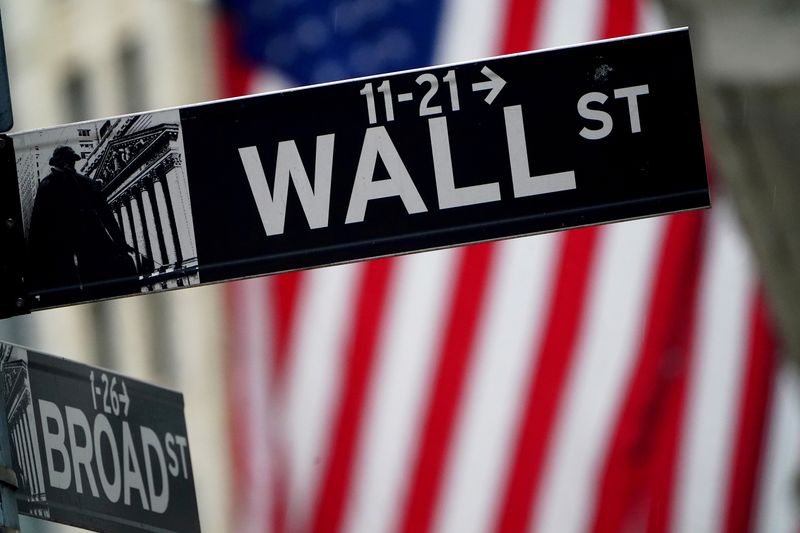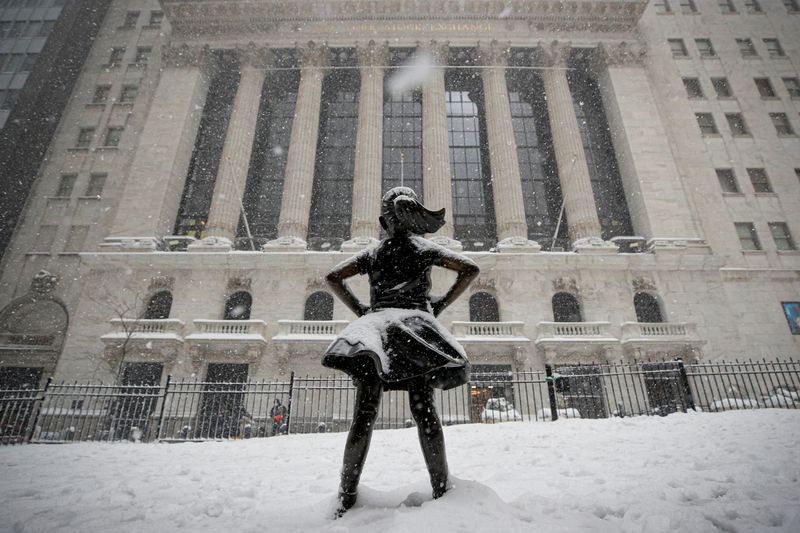LONDON (Reuters) -
1/ YIELD JOLT
Higher U.S. Treasury yields have so far done little more than jolt equity markets off record highs. That will change if "real" yields -- adjusted for inflation -- take off.
It was last year's real yield plunge which sent cash flooding into stocks; while expensive, they looked like a good deal compared with real yields of minus 1%.
But big-time government spending plans and prospects of economic reopening have lifted real 30-year Treasury yields to eight-month highs, just 11 basis points shy of 0%. Ten-year real yields are at five-week peaks.
There's little consensus on when yields will become a problem for equities. But some assets are already seeing an impact -- gold for instance struggles to compete with income-bearing investments when yields rise and is down 6% this year.
Graphic: It's getting real - https://graphics.reuters.com/USA-BONDS/REAL/rlgpdejxyvo/chart.png
2/KIWI TAPER
The Reserve Bank of New Zealand's meeting on Wednesday might tell us if the first country to reduce COVID-19 cases almost completely will also be the first to consider cutting back monetary policy support.
A lot has changed since the RBNZ's November policy statement. The kiwi economy is beating forecasts and markets are no longer pricing in negative rates.
Governor Adrian Orr will revise up forecasts for growth and inflation but he faces a communications challenge: acknowledging improvement without spooking markets.
A rate rise may be years away but the prospect of a stimulus slowdown is on investors' minds -- 10-year sovereign bond yields are up 50 bps this year.
Graphic: New Zealand's economy bounces back - https://fingfx.thomsonreuters.com/gfx/mkt/oakveredjpr/Pasted%20image%201613729699719.png
3/DEBT, DEFAULTS, DEBATES
Debt relief for low-income economies will be high on the agenda of G20 finance officials when they meet on Feb. 26-27.
They will debate the idea of extending IMF funding and the initiative allowing the poorest countries a six-month suspension on some debt payments, as well as more comprehensive relief. There are also calls for the G20 to lead a global COVID-19 immunisation plan.
It will be the first G20 meeting since Joe Biden took over as U.S. president, so the tone may be very different from the Trump years which saw many global alliances fractured. That could be a positive shift at a time when countries are struggling to ensure economic recovery stays on course.
Graphic: Debt-to-GDP ratios of DSSI countries with sovereign bonds - https://graphics.reuters.com/AFRICA-DEBT/qzjvqmlllvx/chart.png
4/TURNING 140
The British pound has become an unexpected currency market poster child for the COVID-19 recovery theme.
It has marked a major milestone in hitting $1.40, a near three-year high. But just two months ago it was mired in Brexit risks and the worst economic outcome of any major industrialised country.
Since mid-December, sterling has strengthened by around 5.5% against the dollar and by 6.5% versus the euro as Britain's vaccination programme got off to a flying start. Hopes of an earlier end to lockdowns have lifted it 2% against the dollar in February.
Some consider the pound expensive. A Reuters poll predicted the U.S. economy would recover to pre-pandemic levels within a year but saw Britain taking twice that time.
There's also the question of whether the Bank of England might take interest rates negative. Money markets expect it will, though not before the second half of 2022.
Graphic: GBP top FX performer - https://fingfx.thomsonreuters.com/gfx/mkt/jbyprdmwnpe/GBP%20top%20FX%20performer.JPG
5/SPAC-TACULAR SPAC-TION, SPAC-KMAN.
Journalists are rummaging through their pun drawers for ways to describe the deluge of special purpose acquisition companies (SPACs) that have hit markets over the past year.
SPACs are essentially blank cheque companies which raise money in an initial public offering with the aim of buying a private firm and taking it public.
Already this year, 144 SPACs have raised $45.7 billion, data from SPAC Research shows, often backed by high-profile investors and celebrities.
The trend is not without bad press. Investment banks managing the deals earn fees by finding the SPAC a company to acquire -- within two years. That raises fears of insufficient due-diligence.
While primarily a U.S. phenomenon, SPACs are sprouting in Europe too. Ex-UniCredit CEO Jean-Pierre Mustier, and German tycoons Christian Angermayer and Klaus Hommels have announced SPACs.
SPAC launches are plentiful but how actual acquisitions -- or "deSPACing" -- develop will show whether the trend lasts.
Graphic: SPAC boom - https://fingfx.thomsonreuters.com/gfx/mkt/xegvbwlnxpq/spac.PNG

